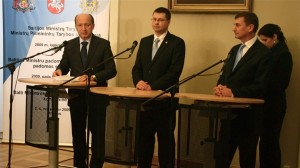
Despite media speculation to the contrary, the three Baltic prime ministers affirmed their nations' committment to the new nuclear power plant Friday. Photo by Nathan Greenhalgh.
VILNIUS — Estonia and Latvia reaffirmed their commitment to build the Visaginas nuclear power plant in a meeting between the three Baltic prime ministers in the Lithuanian capital.
The plant will replace the Ignalina nuclear power plant, due to be decommissioned on Dec. 31 under European Union requirements.
“We have the intention to participate and we know there is a lot being done in our energy companies,” Latvian Prime Minister Valdis Dombrovskis said at a press conference after the meeting.
The three countries have not signed a written agreement on the project, and the Lithuanian media has been rife with speculation about the abilities and intentions of Estonia and Latvia to finance the construction of the plant. The first reactor is scheduled to be complete in 2016, and the second in 2018.
“We would like to take part in the Visaginas power plant. It is well known that we have oil shale for the next 40 years in Estonia,” Estonian Prime Minister Andrus Ansip said referring to the natural reserves that the country has.
“But we don’t know how much we will have to pay for those carbon dioxide emissions tomorrow and we would like to diversify the energy source and move forward with Visaginas,” he said. Oil shale is a fossil fuel and under new climate change policies, Estonia will have to pay taxes on the carbon emissions.
Lithuanian Prime Minister Andrius Kubilius said discussions had been good between the three countries and that the open Baltic energy market, which will remove tariffs for sales between the countries, is going ahead.
“Last night our energy minister Arvydas Sekmokas outlined big challenges in our cooperation. Progress is good. We have a clear plan how to move forward with our previous agreements with the operation of transparent and liberal electricity market,” Kubilius said.
The Open Baltic Energy Market was created earlier this year and will liberalize the market allowing the countries to sell to each other. Energia Estonia has already signed a contract with Lithuania to supply the country next year with around 10 percent of its energy needs.
The Ignalina nuclear power plant, which was built during the Soviet Union is still in operation, but must be shut down by the end of 2009, in accordance with the country’s accession agreement with the European Union due to its similarity in design to the ill-fated Chernobyl power plant.












